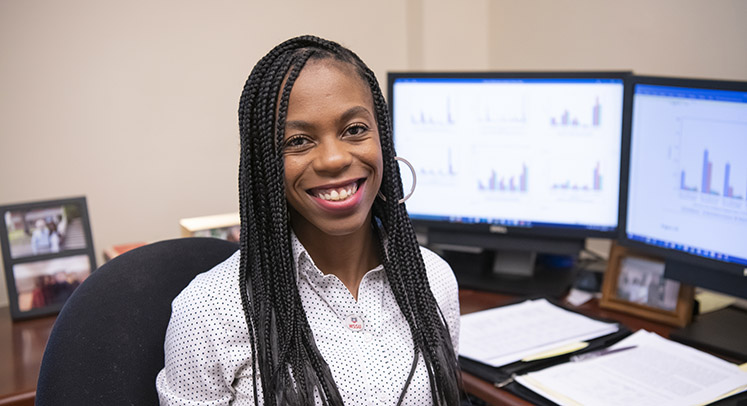WSSU Study Shows Minorities, Disabled Face Even Greater Health Care Barriers During COVID-19 Pandemic

It is no secret that underserved segments of the population … minorities and the disabled … face serious barriers when it comes to health care in this country.
A team of Winston-Salem State University faculty members – Dr. Tammara Thomas, Dr. Keisha Rogers, and Dr. Felicia Simpson – recently concluded research that showed those barriers were even more pervasive during the COVID-19 pandemic.
“There was a growing concern among disability organizations, specifically in the midst of the COVID-19 pandemic, regarding health care policies that impede people with disabilities from receiving equitable and fair treatment. Inequitable and biased treatment of racial and ethnic minority populations within the health care system has been a longstanding and pervasive issue,” said Simpson, who is an assistant professor in the WSSU mathematics department and has a Ph.D. in statistics.
“That’s why this project is so important. We wanted to see if there were barriers that impacted public health care in the disabled and minority populations during COVID.”
The study, funded by the University of North Carolina Board of Governors, examined barriers pervasive to access to health care, access to economic resources, and availability of public health messaging to minority and elderly populations with disabilities in the Piedmont area.
It was not an easy task to complete a broad-based study during COVID-19, a time when social distancing was the prescribed norm. But with the help of more than a dozen community partners, 527 people participated in the study, with 468 completing all the questions in the survey. Data collection began in July of 2020 and surveys were conducted both virtually and in person.
Participants in the study were recruited through community partners in the Piedmont Triad, including the North Carolina Division of Vocational Rehabilitation, the American Legion, Addiction Recovery Care Association, Division of Services for the Blind, Mental Health Association of Forsyth County, and Mind Body Institute Beyond, PLLC.
“The first part of the study was to collect the data. Dr. Thomas and Dr. Rogers played a key role in that,” said Simpson. “They had a better relationship with the community partners. There was a lot of work for them that went on to about November.”
That’s when Simpson began to crunch the numbers.
“I love math. This is the perfect thing for me,” said Simpson. “My major role in this was to analyze the data, use data to tell a story, give meaning to numbers that is impactful.”
Once all the results had been analyzed, the team concluded that the study “provided evidence that people who have a disability, are under-resourced, and are members of minority populations in the Piedmont Triad area have an increased risk of experiencing COVID-19 related disparities which impede access to health care, economic resources, and public health information.”
The results, Simpson said, were not surprising.
“Some of the things we found were that people who were disabled were more likely to have lower education, unemployed, have more children, live in public housing and not have good access to health care,” said Simpson. “Participants classified as disabled were associated to have odds two times as likely not to have access to healthcare. People who do not have transportation don’t have access. People who were working part time had increased odds of not having access to health care during COVID compared to people who work full time.”
Results of the study have been submitted to the university and the funding agency, the University of North Carolina Board of Governors. The team is now working to have the study published in various journals.
